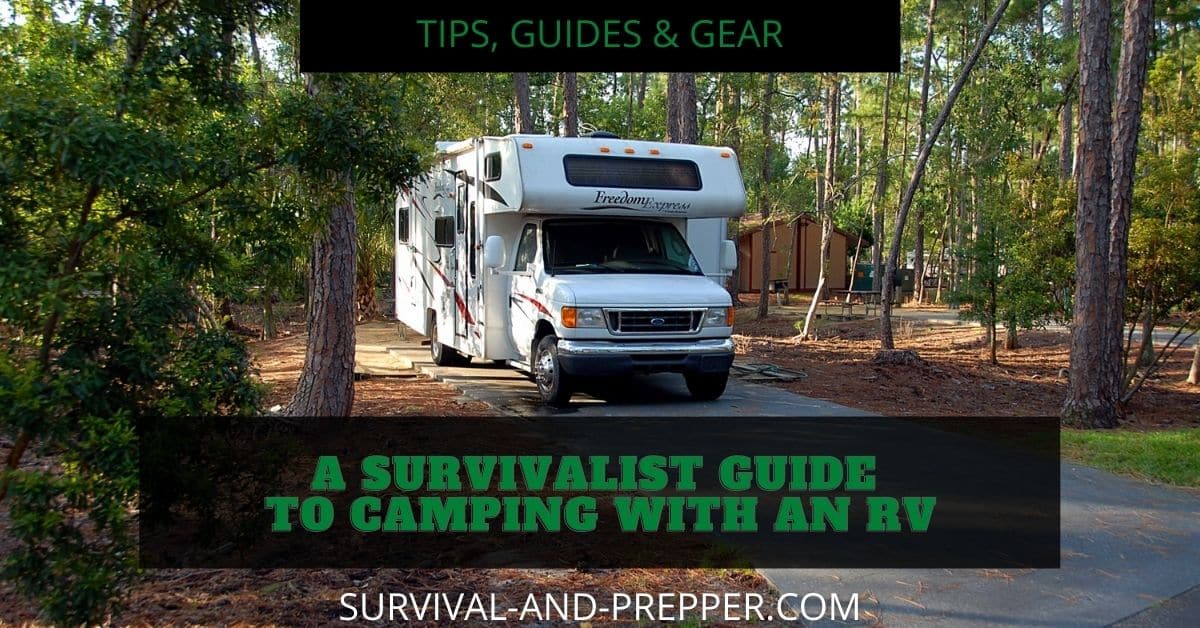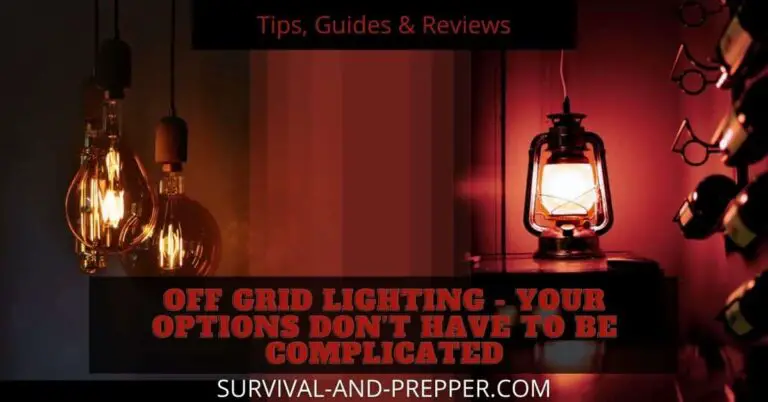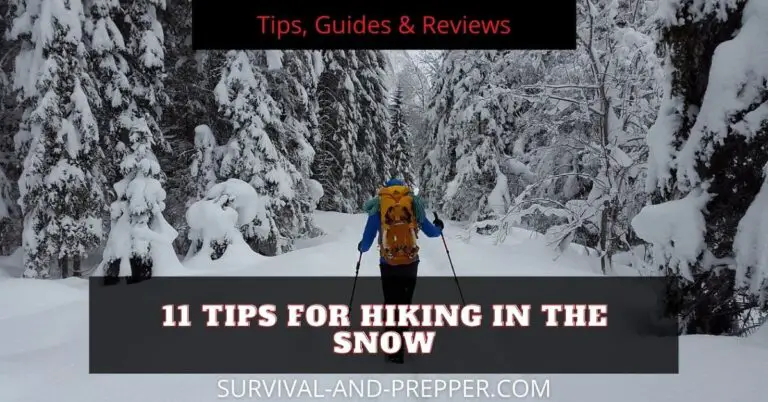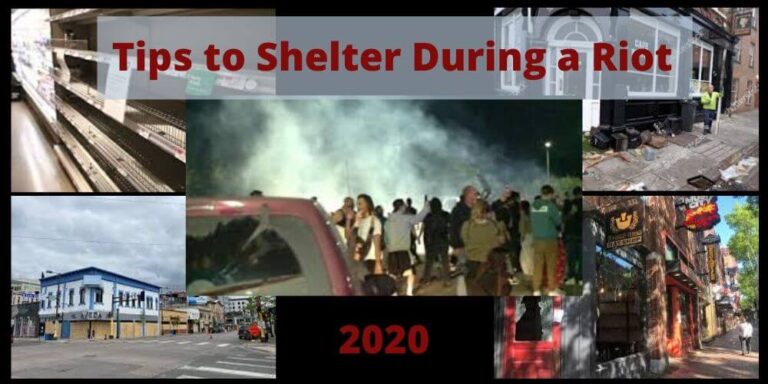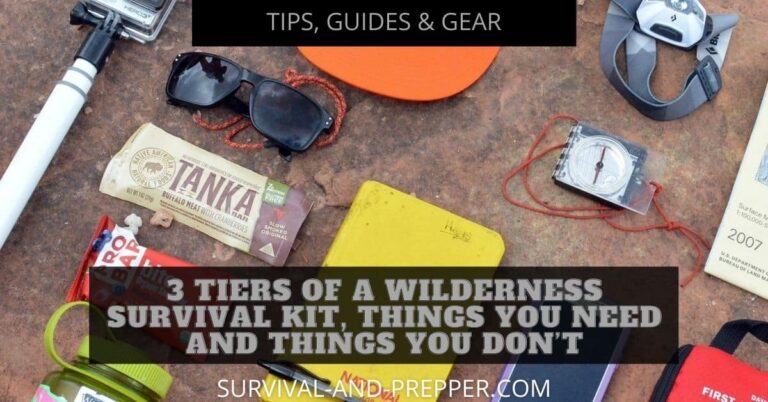The Survivalists Guide to Camping with a RV
You might be asking why go camping in a RV?
RV camping allows you to bring the comforts of home right to the campground. Due to the size of a RV you can have everything with you no matter where you go. Most RVs also have generators and water holding tanks allowing you to be off grid for several days while maintaining your comfort levels. A RV will allow you to experience the open road and the freedom to go on your own Great American Road Trip.
The bigger question for my readers here is probably why is he suggesting a RV on a survivalist site? While it is true that most survivalists tend to be minimalists a RV could be a great addition to their supplies. If it becomes necessary to bug out to a secondary location then having a RV on hand could make a great vehicle to do it in.
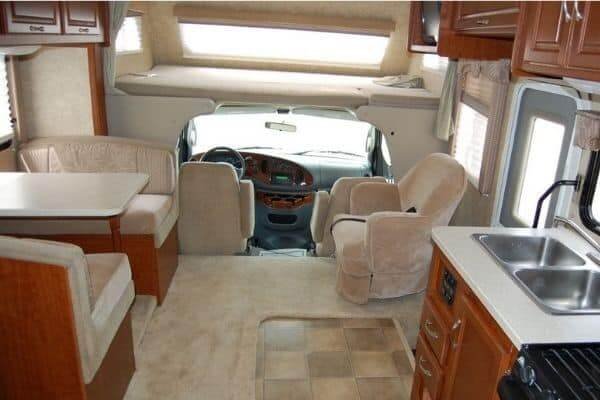
Essentially it would become your home on wheels, containing beds, stoves, and even water and power to sustain you for several days until you arrive at your destination. A RV could also serve as the primary residence in your bug out location if necessary.
Lastly it is important to note that just because you have a RV does not mean you are neglecting your survival skills, it simply means that you’re adding one more level in your preparations. More options always increase your odds of survival.
Now on to the basics of camping with a RV that all of you normal people and preppers alike can use.
What are my Options for Picking up a RV?
You can either outright purchase a RV. If you choose to do so you can buy one that is new off the lot or possibly pick up one that is used at a discounted price. Another option if you wish to just try out RV camping is to rent a RV. There are quite a few companies that you can choose from that rent out RVs.
Purchasing a RV
How much does a RV cost? Purchasing a brand new entry level Class C RV will cost around $71,000 based on an average of ten top selling brands. A Class B will cost around $75,000 and a Class A Diesel Pusher starts at around $125,000. For most beginners a Class C is what they will be looking for. Camperreport.com has some excellent articles on purchasing a RV and other things to consider beyond price.
The Guide To Camping Chairs For Kids
Renting a RV and How Does it Work?
When renting a RV you will pay a set price for the RV per day. Additionally you will be allotted a specific amount of miles and any miles over that you will pay an additional fee. You can rent RVs from outdoorsey.com, RVShare.com and cruiseamerica.com to name a few.
The average price you can expect to pay for a Class C Rental is around $200 a night depending on the model.
Renting a RV will allow you to travel anywhere in the United States with very few restrictions. Some will even allow you to go into Canada though most do not allow travel to Mexico.
Things You Should Know to Get The Most From Your RV
Generally speaking operating a Class C RV on the road is not that much different than driving a large van since they share a similar chassis. Hooking up to electric, water and sewer at a campground may be unfamiliar to you so if that is the case make sure to get the rental company to go over these steps with you.
Before you commit to the rental make sure the model you are looking at has the features you need. For instance not every model comes with a generator. Often this is not an issue if you are staying in a campground as many offer full hookups. A full hookup includes water, power and sewer. Though if you were planning to stay at a more remote location no generator could pose a big issue.
Make sure your rental company provides roadside assistance and clarify with them where you plan to go. This ensures they provide coverage in that area and that there are no unknown restrictions.
Camping in a Campground
As mentioned before most campgrounds will have full hookups. Though you should call ahead and verify that they do and that they can fit the size RV you intend to bring. Some campgrounds offer tent sites only or may only offer partial hookups which will not have sewer lines in most cases. The final type of campsite you will encounter are known as primitive sites. These offer neither water, power or sewer and you will be forced to do without or rely on the built in capabilities of the RV.
Most of the larger campgrounds will include additional amenities such as showers, laundry and entertainment options. It is important to keep in mind though that in addition to the cost of the RV you will often be spending between $35 and $100 a night for the space at the campground you choose.
Driving on the Roadway
One of the largest advantages to a RV is that you have far more space while traveling on the road. Due to their design passengers are allowed to be in the back part of the RV though they really should be seated and buckled in. Additionally it is possible to use the bathroom while on the road. Nearly every RV also includes a fridge and plenty of room to store food. All of these things combine to eliminate many of the expenses of stopping every few hours for a bathroom break and snack.
Towing a Vehicle With a RV
Another thing you want to consider is towing a vehicle with the RV. Many Rvs are capable of towing a smaller car behind them. This will allow you to leave the RV parked in the campground while you use the more maneuverable vehicle to go exploring once you have reached your final destination. Check with the rental company to see if they allow towing.
If you are purchasing a RV and wish to tow a vehicle regularly with it then consider spending the extra money to get a RV with a diesel engine as they are better equipped to tow.
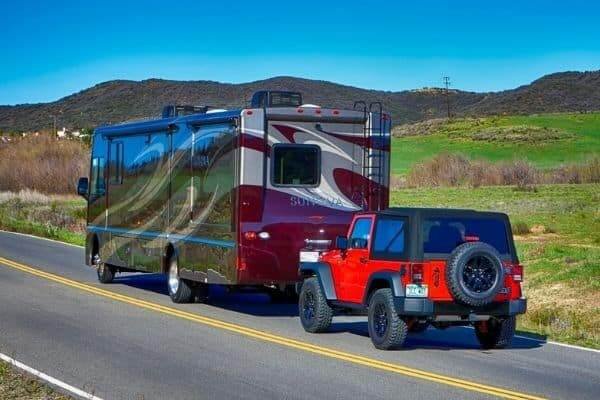
Packing List for Camping with a RV
The real reason to pick a RV on a normal camping trip is obviously convenience. The amount of space available makes it super east to bring comfort and convenience items with you. Some of the items on this list are included with a RV rental, but are listed here just to make sure you consider them.
- Clothes – Several extra outfits just incase
- Pillows
- Bedding – Sleeping Bags or Sheets and Blankets
- Cleaning Supplies – Both for kitchen and bathroom
- Towels – bath and kitchen
- Pots, Pans, Plates and other dishes
- Cups – Coffee, drinking or water bottles
- Camping Chairs – You will spend most of your time outside the RV
- Lights – Drop Lights, Headlamps and Rope Lights are Popular
- Large Tarp
- Outdoor Rug or Door Mat
- Laundry Bag or Extra Suitcase for Dirty Clothes
- RV Toilet Paper – yes they often require special paper
- 4 to 6 Large wooden Blocks to help level RV
- Fishing Gear
- Outdoor Play Equipment – Footballs Etc
- Small hatchet for firewood
- And the List goes on – Check out this Guide if you Need More suggestions.
Interested in extra lighting or campsite lights? Check out our article on Off Grid Lighting several of the tips there would be great for camping.
The Survivalist and a RV
Now we have returned to the point at which my normal readers can find tips they need. In some families different partners enjoy different things. My wife does not like roughing it in the woods with minimal or no shelter, however both me and my boys do.
This type of camping is often referred to as Cowboy camping since we do not even use a tent. By using our RV it allows my wife to join us in a more comfortable environment and me and the boys can sleep outside in a wilderness setting.
We have also dedicated one of the storage compartments on our RV to bug-out-bags. Each family member has one stocked with a weeks worth of supplies and larger more family oriented items split between the packs. For instance one pack has ropes etc while another has tarps. This allows us to be ready to go at a moment’s notice, but split the load up into portions that we can each manage.
Many RVs are solar panel compatible and solar panels can be installed on their roofs. This coupled with a small solar powered water pump and filter could be used to refill your storage tanks from a stream if it became necessary. Between the solar panels and water supply from a stream you could effectively go off grid at a moment’s notice if you had to.
Try Something New
The next time you are planning that beach trip in a condo, or that camping trip in a cabin why don’t you rent a RV first and give it a shot. While you’re here make sure to check out some of our other articles such as How to Pitch a Tent.
